Jiarong Jiang
On Synthetic Data Strategies for Domain-Specific Generative Retrieval
Feb 25, 2025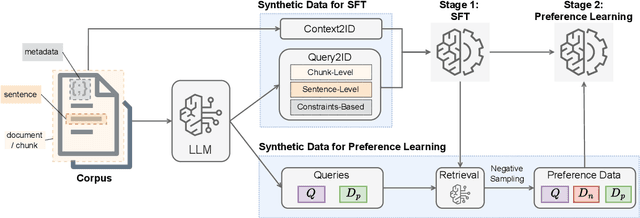


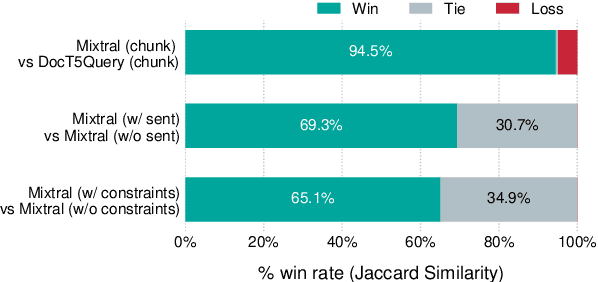
Abstract:This paper investigates synthetic data generation strategies in developing generative retrieval models for domain-specific corpora, thereby addressing the scalability challenges inherent in manually annotating in-domain queries. We study the data strategies for a two-stage training framework: in the first stage, which focuses on learning to decode document identifiers from queries, we investigate LLM-generated queries across multiple granularity (e.g. chunks, sentences) and domain-relevant search constraints that can better capture nuanced relevancy signals. In the second stage, which aims to refine document ranking through preference learning, we explore the strategies for mining hard negatives based on the initial model's predictions. Experiments on public datasets over diverse domains demonstrate the effectiveness of our synthetic data generation and hard negative sampling approach.
PRACTIQ: A Practical Conversational Text-to-SQL dataset with Ambiguous and Unanswerable Queries
Oct 14, 2024
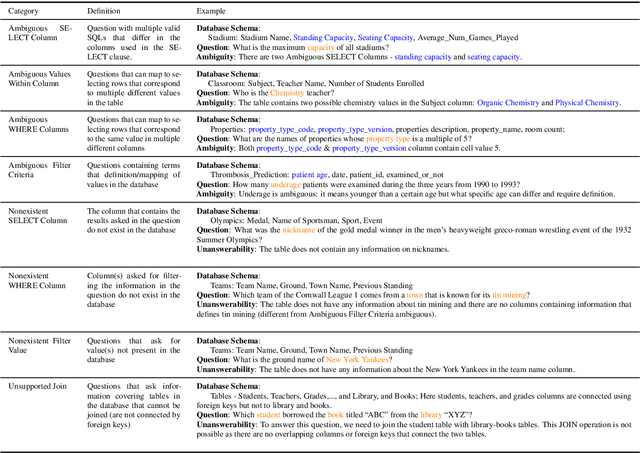
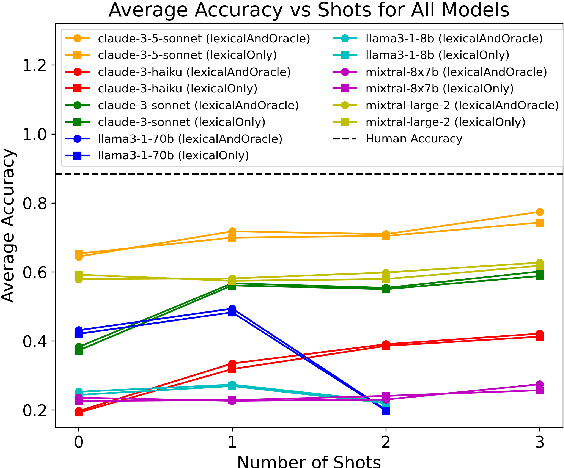
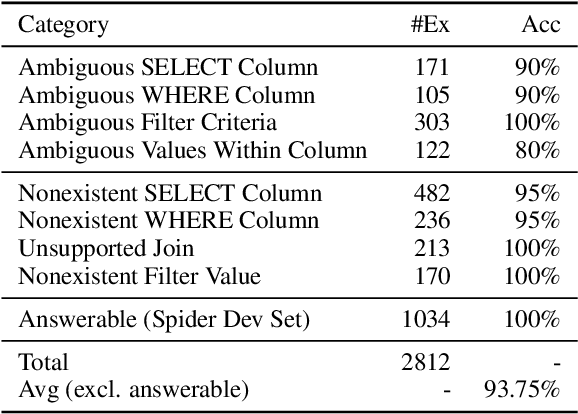
Abstract:Previous text-to-SQL datasets and systems have primarily focused on user questions with clear intentions that can be answered. However, real user questions can often be ambiguous with multiple interpretations or unanswerable due to a lack of relevant data. In this work, we construct a practical conversational text-to-SQL dataset called PRACTIQ, consisting of ambiguous and unanswerable questions inspired by real-world user questions. We first identified four categories of ambiguous questions and four categories of unanswerable questions by studying existing text-to-SQL datasets. Then, we generate conversations with four turns: the initial user question, an assistant response seeking clarification, the user's clarification, and the assistant's clarified SQL response with the natural language explanation of the execution results. For some ambiguous queries, we also directly generate helpful SQL responses, that consider multiple aspects of ambiguity, instead of requesting user clarification. To benchmark the performance on ambiguous, unanswerable, and answerable questions, we implemented large language model (LLM)-based baselines using various LLMs. Our approach involves two steps: question category classification and clarification SQL prediction. Our experiments reveal that state-of-the-art systems struggle to handle ambiguous and unanswerable questions effectively. We will release our code for data generation and experiments on GitHub.
RAGChecker: A Fine-grained Framework for Diagnosing Retrieval-Augmented Generation
Aug 15, 2024



Abstract:Despite Retrieval-Augmented Generation (RAG) has shown promising capability in leveraging external knowledge, a comprehensive evaluation of RAG systems is still challenging due to the modular nature of RAG, evaluation of long-form responses and reliability of measurements. In this paper, we propose a fine-grained evaluation framework, RAGChecker, that incorporates a suite of diagnostic metrics for both the retrieval and generation modules. Meta evaluation verifies that RAGChecker has significantly better correlations with human judgments than other evaluation metrics. Using RAGChecker, we evaluate 8 RAG systems and conduct an in-depth analysis of their performance, revealing insightful patterns and trade-offs in the design choices of RAG architectures. The metrics of RAGChecker can guide researchers and practitioners in developing more effective RAG systems.
Towards a Holistic Evaluation of LLMs on Factual Knowledge Recall
Apr 24, 2024Abstract:Large language models (LLMs) have shown remarkable performance on a variety of NLP tasks, and are being rapidly adopted in a wide range of use cases. It is therefore of vital importance to holistically evaluate the factuality of their generated outputs, as hallucinations remain a challenging issue. In this work, we focus on assessing LLMs' ability to recall factual knowledge learned from pretraining, and the factors that affect this ability. To that end, we construct FACT-BENCH, a representative benchmark covering 20 domains, 134 property types, 3 answer types, and different knowledge popularity levels. We benchmark 31 models from 10 model families and provide a holistic assessment of their strengths and weaknesses. We observe that instruction-tuning hurts knowledge recall, as pretraining-only models consistently outperform their instruction-tuned counterparts, and positive effects of model scaling, as larger models outperform smaller ones for all model families. However, the best performance from GPT-4 still represents a large gap with the upper-bound. We additionally study the role of in-context exemplars using counterfactual demonstrations, which lead to significant degradation of factual knowledge recall for large models. By further decoupling model known and unknown knowledge, we find the degradation is attributed to exemplars that contradict a model's known knowledge, as well as the number of such exemplars. Lastly, we fine-tune LLaMA-7B in different settings of known and unknown knowledge. In particular, fine-tuning on a model's known knowledge is beneficial, and consistently outperforms fine-tuning on unknown and mixed knowledge. We will make our benchmark publicly available.
UNITE: A Unified Benchmark for Text-to-SQL Evaluation
May 26, 2023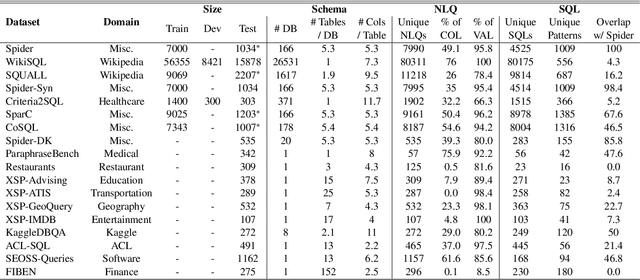
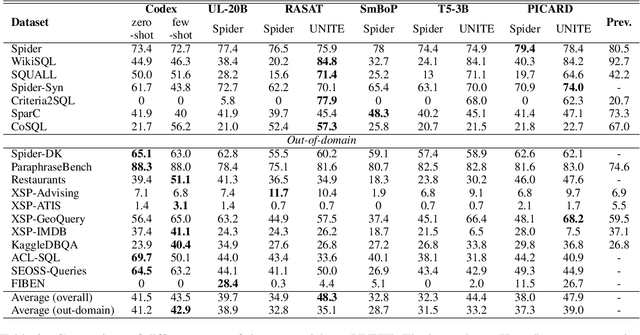
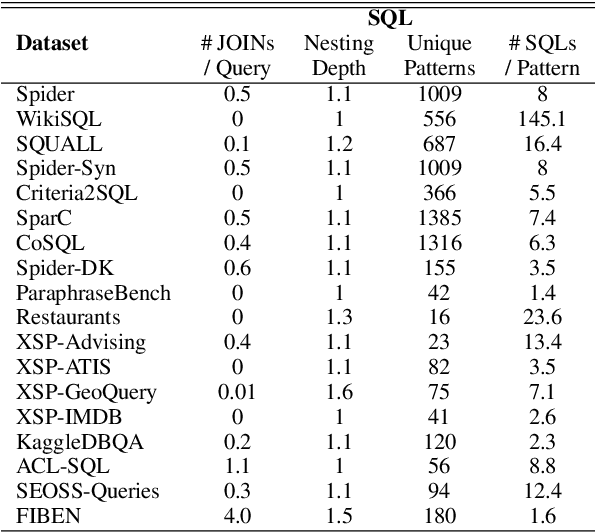
Abstract:A practical text-to-SQL system should generalize well on a wide variety of natural language questions, unseen database schemas, and novel SQL query structures. To comprehensively evaluate text-to-SQL systems, we introduce a \textbf{UNI}fied benchmark for \textbf{T}ext-to-SQL \textbf{E}valuation (UNITE). It is composed of publicly available text-to-SQL datasets, containing natural language questions from more than 12 domains, SQL queries from more than 3.9K patterns, and 29K databases. Compared to the widely used Spider benchmark \cite{yu-etal-2018-spider}, we introduce $\sim$120K additional examples and a threefold increase in SQL patterns, such as comparative and boolean questions. We conduct a systematic study of six state-of-the-art (SOTA) text-to-SQL parsers on our new benchmark and show that: 1) Codex performs surprisingly well on out-of-domain datasets; 2) specially designed decoding methods (e.g. constrained beam search) can improve performance for both in-domain and out-of-domain settings; 3) explicitly modeling the relationship between questions and schemas further improves the Seq2Seq models. More importantly, our benchmark presents key challenges towards compositional generalization and robustness issues -- which these SOTA models cannot address well. \footnote{Our code and data processing script will be available at \url{https://github.com/XXXX.}}
Dr.Spider: A Diagnostic Evaluation Benchmark towards Text-to-SQL Robustness
Jan 21, 2023



Abstract:Neural text-to-SQL models have achieved remarkable performance in translating natural language questions into SQL queries. However, recent studies reveal that text-to-SQL models are vulnerable to task-specific perturbations. Previous curated robustness test sets usually focus on individual phenomena. In this paper, we propose a comprehensive robustness benchmark based on Spider, a cross-domain text-to-SQL benchmark, to diagnose the model robustness. We design 17 perturbations on databases, natural language questions, and SQL queries to measure the robustness from different angles. In order to collect more diversified natural question perturbations, we utilize large pretrained language models (PLMs) to simulate human behaviors in creating natural questions. We conduct a diagnostic study of the state-of-the-art models on the robustness set. Experimental results reveal that even the most robust model suffers from a 14.0% performance drop overall and a 50.7% performance drop on the most challenging perturbation. We also present a breakdown analysis regarding text-to-SQL model designs and provide insights for improving model robustness.
Importance of Synthesizing High-quality Data for Text-to-SQL Parsing
Dec 17, 2022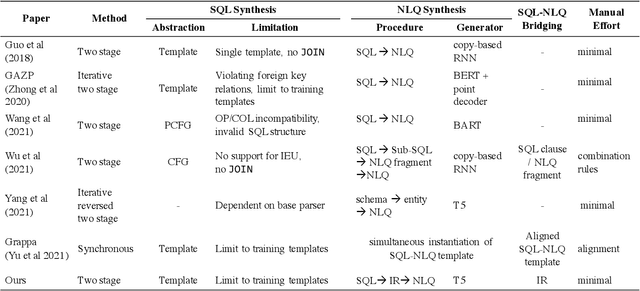

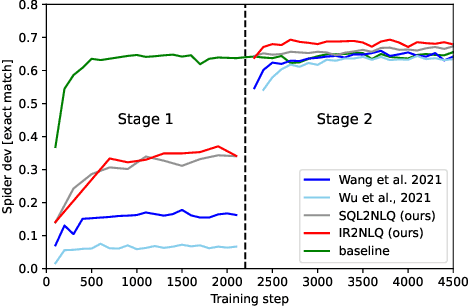

Abstract:Recently, there has been increasing interest in synthesizing data to improve downstream text-to-SQL tasks. In this paper, we first examined the existing synthesized datasets and discovered that state-of-the-art text-to-SQL algorithms did not further improve on popular benchmarks when trained with augmented synthetic data. We observed two shortcomings: illogical synthetic SQL queries from independent column sampling and arbitrary table joins. To address these issues, we propose a novel synthesis framework that incorporates key relationships from schema, imposes strong typing, and conducts schema-distance-weighted column sampling. We also adopt an intermediate representation (IR) for the SQL-to-text task to further improve the quality of the generated natural language questions. When existing powerful semantic parsers are pre-finetuned on our high-quality synthesized data, our experiments show that these models have significant accuracy boosts on popular benchmarks, including new state-of-the-art performance on Spider.
Improving Text-to-SQL Semantic Parsing with Fine-grained Query Understanding
Sep 28, 2022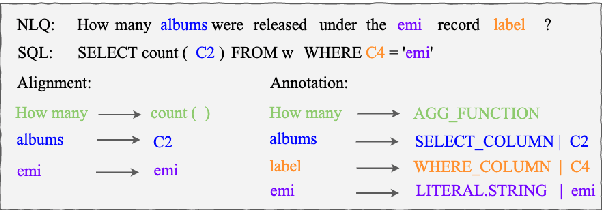
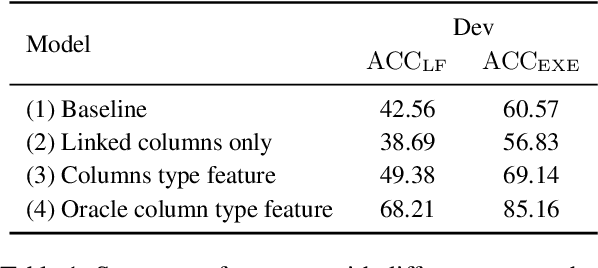
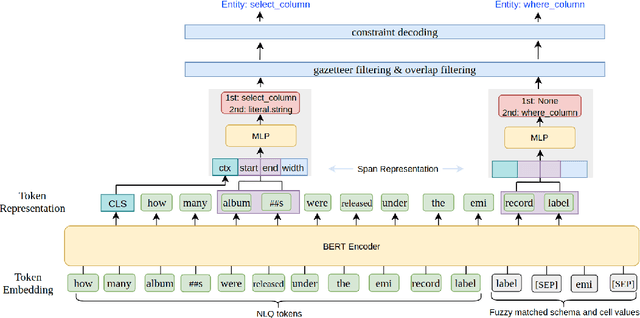
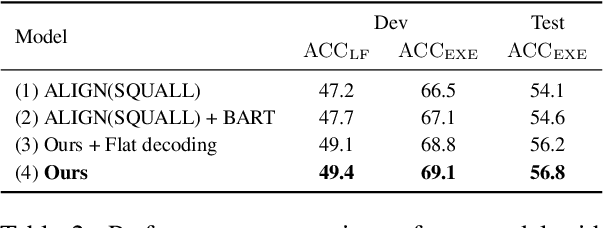
Abstract:Most recent research on Text-to-SQL semantic parsing relies on either parser itself or simple heuristic based approach to understand natural language query (NLQ). When synthesizing a SQL query, there is no explicit semantic information of NLQ available to the parser which leads to undesirable generalization performance. In addition, without lexical-level fine-grained query understanding, linking between query and database can only rely on fuzzy string match which leads to suboptimal performance in real applications. In view of this, in this paper we present a general-purpose, modular neural semantic parsing framework that is based on token-level fine-grained query understanding. Our framework consists of three modules: named entity recognizer (NER), neural entity linker (NEL) and neural semantic parser (NSP). By jointly modeling query and database, NER model analyzes user intents and identifies entities in the query. NEL model links typed entities to schema and cell values in database. Parser model leverages available semantic information and linking results and synthesizes tree-structured SQL queries based on dynamically generated grammar. Experiments on SQUALL, a newly released semantic parsing dataset, show that we can achieve 56.8% execution accuracy on WikiTableQuestions (WTQ) test set, which outperforms the state-of-the-art model by 2.7%.
 Add to Chrome
Add to Chrome Add to Firefox
Add to Firefox Add to Edge
Add to Edge